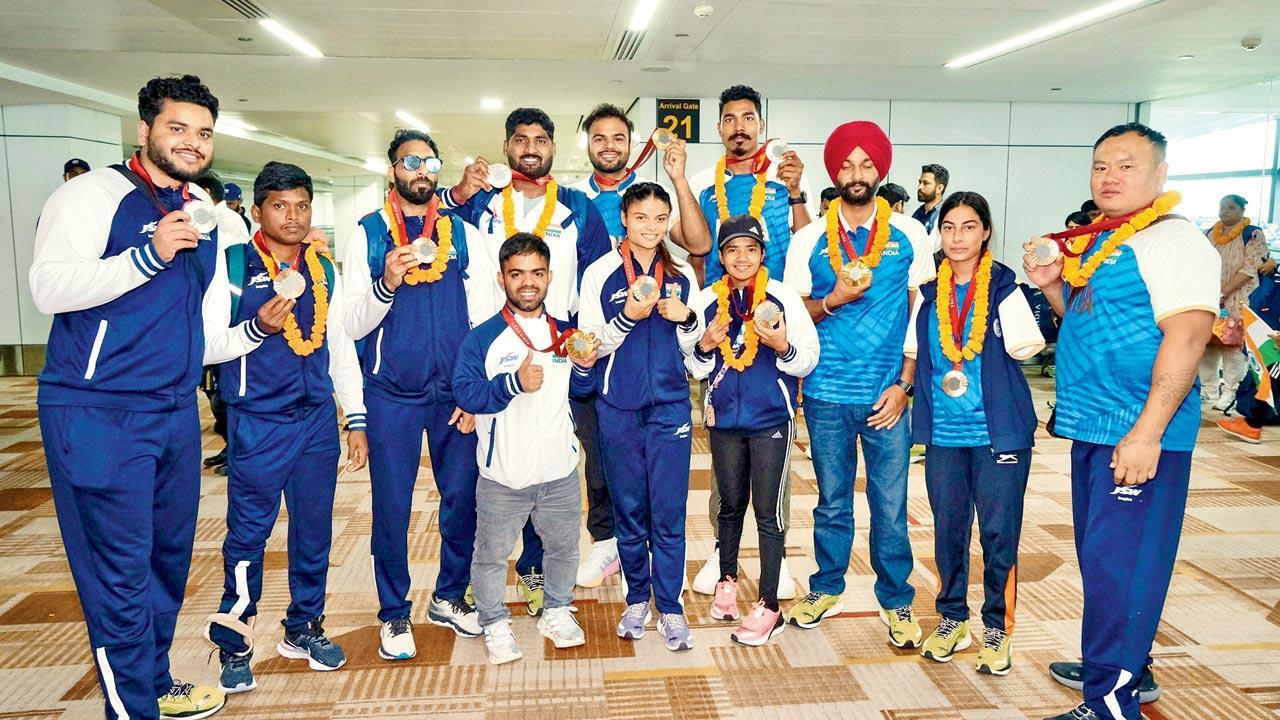India’s performance at the Summer Paralympics is another reminder that we don’t care about people with disabilities

India’s paralympics 2024 winners being welcomed on their return to India on September 7. Pic/PTI
 Here are some facts at the time of this column being written, days before the 2024 Summer Paralympics in Paris comes to a close. According to the sports pages, I see that India sent 84 athletes to compete across 12 sports and won 21 medals as of September 4. There were three gold medallists, eight silver, and ten bronze winners. It is a staggering achievement that barely gets the attention it deserves. These are men and women who have battled incredible odds to bring honour and glory to a country that routinely pretends as if people with disabilities do not exist.
Here are some facts at the time of this column being written, days before the 2024 Summer Paralympics in Paris comes to a close. According to the sports pages, I see that India sent 84 athletes to compete across 12 sports and won 21 medals as of September 4. There were three gold medallists, eight silver, and ten bronze winners. It is a staggering achievement that barely gets the attention it deserves. These are men and women who have battled incredible odds to bring honour and glory to a country that routinely pretends as if people with disabilities do not exist.
ADVERTISEMENT
It is naive for me to suggest that we should be more respectful towards the disabled just because some of them do well at sports. What isn’t naive is pointing out that in 2024, all our talk of becoming a developed nation is at odds with how we plan our cities, and how casually we take the notion of ‘inclusivity’. None of the conversations that involve urban planning take people with special needs into account, and all you have to do is step outside your home and look at whether the street closest to you is navigable by someone who doesn’t need assistance. Imagine having to use a wheelchair, and that picture darkens almost instantly.
According to a report published in 2021 by the Office of Chief Commissioner for Persons with Disabilities, 2.68 crore people, or 2.21 per cent of the total population, were classified as ‘disabled.’ The thing is, the report cited a summary of Census findings from 2011. Results from the Census 2021 are expected to take a while, which makes sense given that the government has only had three whole years to access that data. In July 2023, the Union government was called out by the Parliamentary Standing Committee on Social Justice and Empowerment for failing to accurately estimate the current population of persons with disabilities. Unfortunately, as we all know, if pulling the government up for anything were to lead to better things, we would have functional roads today.
The reason I mention the Paralympics is cynicism. Nothing gets much attention in these parts if the possibility of good PR doesn’t exist. We appear to be living in a time where stories matter more than substance, where something changes only if it makes an official look good, and where nothing can be announced if there isn’t space on the poster for a photograph of the Prime Minister. It’s why I have this absurd hope that the winning of all those medals may finally lead to something positive for people who have been ignored for too long. Maybe someone in power may finally decide to cancel a cash prize of a few crores for cricketers and talk about building ramps or better infrastructure for people with disabilities instead.
In January this year, a report by the Centre for Research and Planning of the Supreme Court revealed the challenges faced by people with disabilities when it comes to accessing justice. It was the first time a report like that had been compiled, which is great because it is a sign that change may be delayed but may still come for future generations. According to the report, more than half of India’s District Court complexes do not have ramps. 25.2 per cent offer wheelchairs, while just 5.1 per cent have tactile paving to assist people with visual impairments. The implications are frightening, given how hard access to justice already appears to be for a majority who don’t have to deal with additional challenges posed by hearing or visual impairment.
Courts aside, it doesn’t take much to accept that people with disabilities are almost never thought about when something around us is being built. Our public and private spaces don’t acknowledge their difficulties, and our roads haven’t been safe even for the able-bodied for decades. I won’t bother commenting on our public transport, because anyone who has to cross an overbridge during rush hour will know how futile that exercise is.
A country that claims to be developed shouldn’t be judged by the number of flyovers it has, or by the height of its skyscrapers. Progress is to be measured by whether or not a country cares for its most vulnerable people. By that measure, India has failed and continues to do so. If we can applaud our athletes at the Paralympics, we ought to raise our voices and demand that the government think about them a bit more, long after the games have ended.
When he isn’t ranting about all things Mumbai, Lindsay Pereira can be almost sweet. He tweets @lindsaypereira
Send your feedback to mailbag@mid-day.com
The views expressed in this column are the individual’s and don’t represent those of the paper
 Subscribe today by clicking the link and stay updated with the latest news!" Click here!
Subscribe today by clicking the link and stay updated with the latest news!" Click here!







